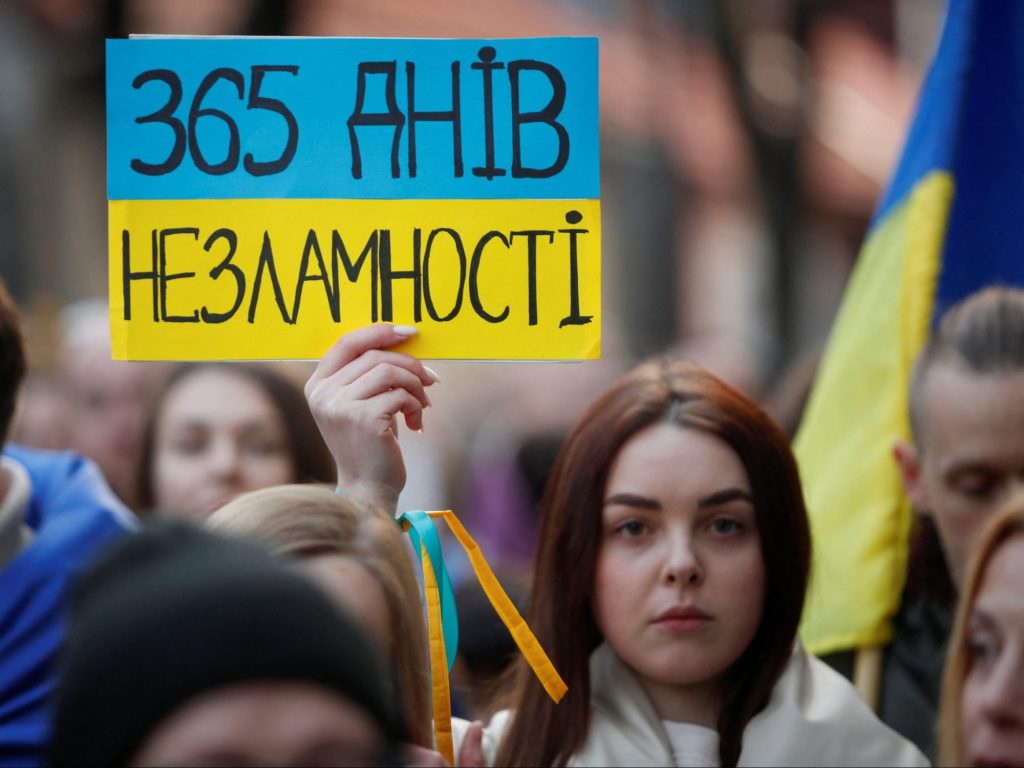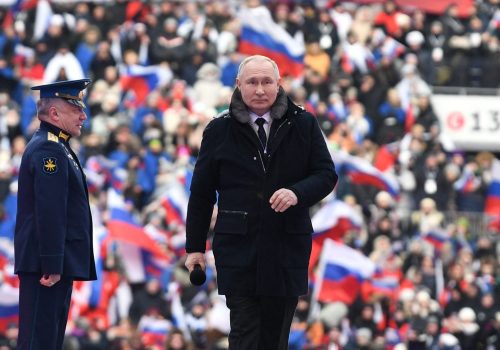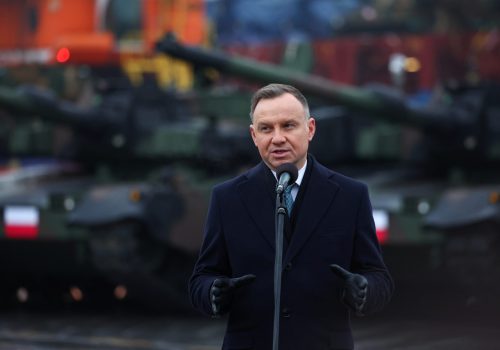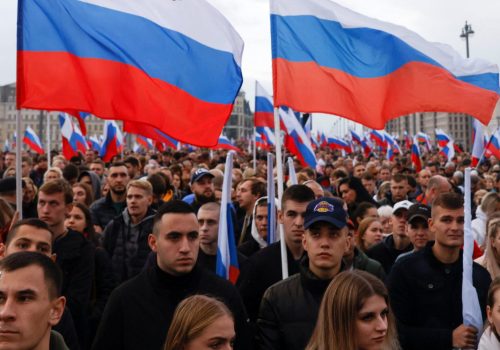When my family and I left Kyiv on the first morning of Russia’s full-scale invasion last February, we had no idea if we would ever be able to return home or whether Ukraine itself would survive. In the following days, as the biggest European conflict since World War II continued to unfold, this sense of dread only deepened.
One year on, I can now look back with slightly less emotion and a sense of cautious optimism that is rooted in the remarkable resilience of the Ukrainian nation. Ukraine has not only survived, but has actually achieved a number of landmark battlefield victories over Putin’s invading army and has proven to international audiences that Russia can be beaten.
On the personal front, I have been back in Kyiv since May 2022, although my wife and two children remain among the millions of Ukrainians currently living in exile. Thankfully, they are able to visit.
Life in wartime Ukraine can be extremely stressful but Ukrainians have proven themselves far tougher and more resourceful than almost anyone could have imagined. For those living in Kyiv and other Ukrainian cities far from the front lines, the greatest threat has come from frequent Russian missile and drone attacks. This airstrike campaign began on October 10 and has since become a feature of daily life.
During those initial October air raids, I found myself in our makeshift neighborhood bomb shelter for the first time, huddled in an underground car park together with 100 other people and their assorted pets. More recently, if I am at home when an attack takes place, I can often see explosions from my apartment window and feel the impact of incoming missiles through the shaking walls of the building.
Russia’s air campaign brought the war closer for millions of Ukrainians, creating a sense of heightened physical danger along with frequent blackouts. The whole of Ukraine spent the winter season with severely limited access to light, electricity, heating, water, and internet. I often had to walk up 20 flights of stairs just to reach my apartment. For people with mobility issues or families with small children, that is simply not an option.
Despite these hardships, Russia’s air attacks have failed to break Ukraine’s spirit. While everyone inevitably talks about the many inconveniences these attacks bring, nobody really complains. Instead, there is an understanding that this is part of the price we must pay for finally saying goodbye to Russia, and a determination to get on with our lives. After the first major attacks, people were shocked and discussed the implications for days on end. But after a few weeks, cafes and restaurants would fill up again within hours of each new bombardment.
Over the past five months, Ukrainians have acquired vast quantities of generators to provide power for businesses, homes, and public services. Each time a blackout begins, an orchestra of generators starts to play. This rumbling of engines has served as the background soundtrack to the winter season in wartime Ukraine. Meanwhile, we have all learned to keep our gadgets fully charged and to have power banks at the ready, just in case. Life goes on.
Stay updated
As the world watches the Russian invasion of Ukraine unfold, UkraineAlert delivers the best Atlantic Council expert insight and analysis on Ukraine twice a week directly to your inbox.
Winter is now coming to an end and Ukrainians have not been frozen into submission. Indeed, there have been very few blackouts in recent weeks as Ukraine’s heroic air defense forces and power sector professionals continue to perform miracles. Putin’s bombing campaign is the latest in a long line of unsuccessful Russian efforts to undermine Ukrainian morale.
Surprisingly, the Kremlin-controlled Russian media openly boasted of targeting civilian infrastructure in Ukraine. Prior to the onset of the air attacks in late 2022, Kremlin propagandists had consistently insisted that the Russian army only struck military targets. However, it seems that a series of embarrassing military defeats in Ukraine left the Putin regime in desperate need of victories. It says much about the state of Russia’s war effort that the only victory Moscow could hope to deliver was news that Ukrainian civilians were being plunged into freezing darkness in the depths of winter.
The defiant Ukrainian response to Moscow’s terror-bombing tactics reflects the mood in the country as the war enters its second year. It also underlines the counter-productive nature of Putin’s invasion. The Russian dictator wanted to wipe out Ukrainian identity entirely. Instead, he has achieved the exact opposite.
Eurasia Center events

Throughout the country, Ukrainian national identity is visibly strengthening. Many people are switching from Russian to the Ukrainian language in their everyday lives. Monuments to Soviet figures are being removed from public spaces, and streets honoring Russian writers are being renamed. After decades of domestic geopolitical divisions, Ukrainian support for EU and NATO membership has rocketed to over 80% and is backed by strong majorities in every part of the country.
Whereas Ukrainian public anger following the initial Russian invasion of Ukraine in 2014 was largely directed against the Russian political leadership in the Kremlin, we are now witnessing demands for the wholesale de-russification of Ukraine. Most Ukrainians have been sickened by the atrocities of the Russian army and horrified by the obvious popularity of the war among the Russian public. They no longer wish to have anything in common with a nation that destroys entire cities and commits countless war crimes.
Ukrainians also understand perfectly well that when Russians talk about “Ukrainian Nazis” and call for the “de-Nazification” of Ukraine, they actually mean the de-Ukrainianization of Ukraine and the permanent return of the country to Russian control. The atrocities committed by Russian forces in occupied areas of Ukraine have brought home the horrors that would await the rest of the country if Ukrainian resistance were to crumble.
This has helped fuel a national outpouring of volunteerism as everyone has sought to contribute to victory. Ordinary Ukrainians have donated billions of dollars to help fund the country’s defense. People give whatever they can, with some contributing large sums and others handing over their last pennies. One day recently, three young boys approached my car selling home-made bracelets to raise funds for the army. Similar scenes can be encountered in towns and cities across Ukraine every day.
I recently attended a press conference in Kyiv to mark US President Joe Biden’s surprise visit to the Ukrainian capital. Biden made a point of expressing his admiration for Ukraine’s astounding resilience. The reason is simple: we know that our country is currently engaged in an existential fight for survival. If we stop fighting, we will simply disappear. If the Russians stop fighting, the war will end.
As things currently stand, the invasion is far from over. The military situation is complex and unpredictable. Ukraine enjoys strong morale following a series of battlefield successes and is also benefiting from a steady flow of modern weapons from the country’s Western partners. Meanwhile, Russia has strength in numbers thanks to the country’s first mobilization since World War II, while Putin appears to be preparing domestic audiences and the Russian economy for a long war. Ukrainians remain confident of ultimate victory, but there is also widespread recognition that the journey will be long and difficult.
Despite this uncertainty, there are reasons to look ahead with a sense of confidence. One year ago, Kyiv was supposed to fall within a matter of days. Instead, the Ukrainian capital has become a global symbol of courage and freedom. Over the past year, Ukraine has earned the respect of the watching world. Indeed, no country has ever undergone such a complete image transformation in such a short space of time. Once known primarily for corruption and poverty, Ukraine is now a byword for bravery.
For the first time in my life, I firmly believe Ukraine has a realistic change of joining the European Union. When this finally happens, it will confirm a civilizational shift that has been underway for the past few decades as Ukraine has struggled to shake off the shackles of empire and shed the country’s post-Soviet legacy. Despite the horrors of Russia’s ongoing invasion, I am convinced Ukraine is now moving toward better times. Most of all, I am absolutely sure this bright future is thoroughly deserved.
Vitaly Sych is Chief Editor of NV media house which includes a weekly magazine, national talk radio station, and news site NV.ua.
Further reading
The views expressed in UkraineAlert are solely those of the authors and do not necessarily reflect the views of the Atlantic Council, its staff, or its supporters.

The Eurasia Center’s mission is to enhance transatlantic cooperation in promoting stability, democratic values and prosperity in Eurasia, from Eastern Europe and Turkey in the West to the Caucasus, Russia and Central Asia in the East.
Follow us on social media
and support our work
Image: Protesters hold placards during a rally to mark the one-year anniversary of the Russian invasion of Ukraine. February 24, 2023. (REUTERS/Stevo Vasiljevic)





